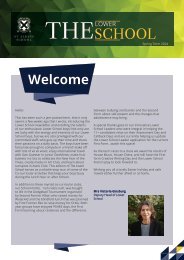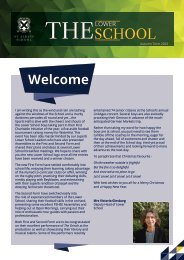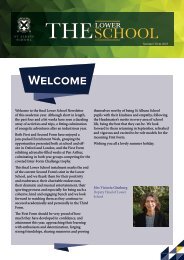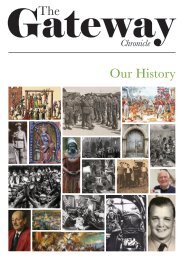Create successful ePaper yourself
Turn your PDF publications into a flip-book with our unique Google optimized e-Paper software.
15<br />
held such as vigils to commemorate the Sharpeville<br />
massacre. Commercial pressure was also brought to<br />
bear as white-owned shops were boycotted, strikes<br />
were organised by labour groups and rents owed to<br />
white landlords were unpaid. As the tide of change<br />
gained momentum, white-only spaces were utilised<br />
by Black citizens; for example Archbishop Desmond<br />
Tutu led a protest march to a whites-only beach<br />
in 1989 and the National Union of Mineworkers<br />
supported a lunchtime sit-in at an all-white canteen<br />
in the same year. These actions positively impacted<br />
the ruling party’s willingness to negotiate with the<br />
ANC and Nelson Mandela because of the disruption<br />
they caused.<br />
The wider actions of the global community also<br />
affected the dismantling of Apartheid in South Africa<br />
but the scale of influence of Black and alliance<br />
communities and states was wider than that implied<br />
by a western focused narrative. South Africa was<br />
involved in armed conflict against liberation movements<br />
in Angola (1975-1977) and South West Africa<br />
(1966-1989) which drained its economic resources<br />
and morale, the impact of which became more<br />
pronounced when combined with more stringent<br />
economic sanctions in the mid-1980s. The conflicts<br />
are often seen as a case of proxy states fighting<br />
with the support of the United States and the Soviet<br />
Union. Although the Cuban forces who fought<br />
against South Africa were communist, it is clear that<br />
Cuba’s motivation was also based on an anti-colonial<br />
ideology: Fidel Castro pledged forces and weapons<br />
in the spirit of proletariat internationalism<br />
and fittingly named the mission ‘Operation Carlota’<br />
after an African woman who had organised a slave<br />
revolt on Cuba. Despite the roles of international<br />
supporters, the agency of the African protagonists<br />
should not be underestimated. In 1984 Angola and<br />
South Africa signed the Lusaka Accords to declare a<br />
ceasefire. Despite the military support of Cuba and<br />
the Soviet Union throughout the conflict, they were<br />
not consulted by Angola until after the agreement<br />
was signed. This demonstrates their autonomy in<br />
resolving the conflict on their own terms.<br />
A further source of political pressure came from the<br />
African Front-Line States, a coalition of countries<br />
which opposed Apartheid in South Africa. These<br />
included Botswana, Mozambique, Tanzania, Zambia<br />
and Zimbabwe, as well as Angola. They gave the<br />
ANC a base from which to operate during the period<br />
when they were banned in South Africa and put<br />
pressure on other members of the Commonwealth<br />
Hidden Voices<br />
to isolate South Africa.<br />
That these military and political pressures worked<br />
in tandem with economic sanctions from the west<br />
is incontrovertible. However, the role of the global<br />
Black community in bringing about these sanctions<br />
is often overlooked. Black American opinion<br />
was mobilised to exert leverage over US banks<br />
and corporations, who began to divest themselves<br />
of holdings in South Africa during the 1980s. In<br />
response to this economic pressure, the value of the<br />
Rand collapsed.<br />
In this political environment of greater international<br />
co-operation and social and economic pressure<br />
from the majority Black population within South<br />
Africa, when F.W. De Klerk became President of<br />
South Africa in 1989, he confounded expectations<br />
by adopting a great deal of the Harare Declaration<br />
in which the ANC had set out the steps that would<br />
create a climate for beginning negotiations. This<br />
crucial step can be overlooked in the narrative of<br />
the fall of Apartheid but it is clear that the ANC set<br />
the terms of the negotiation: Nelson Mandela was<br />
to be released, bans were to be lifted on outlawed<br />
organisations and the state of emergency was to be<br />
lifted. The majority of the conditions of the Declaration<br />
were met. The leader of the ANC, Nelson<br />
Mandela, created a roadmap of the negotiation process<br />
and the first all-race elections in South Africa<br />
were held in 1994, leading to the ANC winning a<br />
majority and Nelson Mandela becoming its President.<br />
In conclusion, it is apparent that although pressures<br />
from the West in the form of economic and sporting<br />
boycotts were significant factors in the dismantling<br />
of Apartheid in South Africa, the activism of<br />
the Black communities in South Africa itself and<br />
the actions of majority governed African states and<br />
their allies should not be overlooked or downplayed.<br />
A climate in which the negotiations on the road<br />
to democracy could be pursued was only possible<br />
because of the economic pressure caused by wars in<br />
neighbouring states such as Angola and South West<br />
Africa (Namibia) and the internal pressure of economic<br />
boycotts, social protest and disobedience. It is<br />
important that the hidden voices of these contributors<br />
are heard so that their agency in the process is<br />
given due recognition.<br />
Jonathan Webb 4.5


















